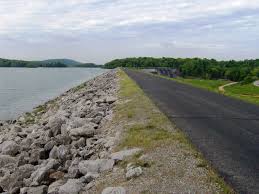dike
英 [daɪk]
美 [daɪk]
- n. 堤防,堤坝;障碍物;(英)壕沟
- vt. 筑堤防护;开沟排水(等于dyke)
- n. (Dike)人名;(英、西)戴克;(塞)迪凯
星级词汇:

记忆方法
1. dig => dyke.
英语词源
- dike (n.)
- Old English dic "trench, ditch; an earthwork with a trench; moat," from Proto-Germanic *dik- (cognates: Old Norse diki "ditch, fishpond," Old Frisian dik "mound, dam," Middle Dutch dijc "mound, dam, pool," Dutch dijk "dam," German Deich "embankment"), from PIE root *dhigw- "to pierce; to fix, fasten" (cognates: Sanskrit dehi- "wall," Old Persian dida "wall, stronghold, fortress," Persian diz).
At first "an excavation," later (late 15c.) applied to the resulting earth mound; a sense development paralleled by cognate forms in many other languages. This is the northern variant of the word that in the south of England yielded ditch (n.).
权威例句
- 1. A small wooden bridge straddled the dike.
- 一座小木桥横跨在排水渠上。
- 2. They dug a dike along walls of the school.
- 他们沿校墙挖沟.
- 3. Fortunately, the flood did not break the dike.
- 还好, 这场大水没有把堤坝冲坏.
- 4. When the river dike is completed , the crops will be safe against floods.
- 修好河堤, 庄稼就不怕淹了.
- 5. The most impressive form of intrusive is the dike.
- 最引人注目的侵入体是岩脉.